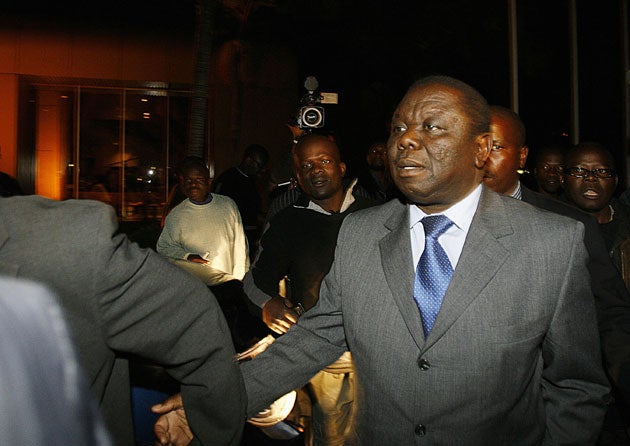Mugabe must back down, says rival

Morgan Tsvangirai, Zimbabwe's opposition leader, has refused to be pushed into a deal that would leave Robert Mugabe in effective control of the country. The man regarded by many as the president-elect said Mr Mugabe would have to cede power before any agreement on a government of national unity would be possible.
Claims from the Mugabe camp that it had divided the opposition appeared to be unfounded.
Mr Tsvangirai said his rival must back down or negotiations would collapse, a source close to the talks told The Independent. Mr Tsvangirai walked out of talks late on Tuesday night after South Africa's President Thabo Mbeki, who is mediator, tried to push him into an agreement that would have made him prime minister in name alone, leaving executive power in the hands of President Mugabe.
Mr Tsvangirai, who won more votes than his rivals in a March election, is demanding executive powers be transferred to a prime ministerial position before he will sign up to any deal. He has come under intense pressure from three sides, as Arthur Mutambara, the leader of a smaller opposition faction, has joined Mr Mbeki and Mr Mugabe in pushing for the 84-year-old President to hold on to as much power as possible. The Mugabe regime is determined to retain control of the security services while leaving Mr Tsvangirai to sort out the devastated economy.
There is increasing anger in the impoverished nation over the role of Mr Mutambara, who has positioned himself closer to the Mugabe camp in a bid to get a government role despite his lack of popular support. He failed to win a seat at the election and his faction has only 10 MPs. While he stopped short of saying he had signed up to the Mugabe plan, yesterday he called on Mr Tsvangirai to make concessions for the good of the country.
A senior official in Mr Tsvangirai's Movement for Democratic Change said there was a major disagreement on the section of the draft agreement – drawn up with the South Africans – dealing with the powers of the prime minister to appoint, chair and run cabinet issues as executive head of government. The wording of that section would have reduced the post of premier to that of ceremonial status, preserving Mr Mugabe's enormous power.
The source said Mr Tsvangirai raised serious objections but his rival would not concede and denied that the talks had collapsed, saying the opposition leader would return to the negotiations when the Mugabe camp changed its position.
"They have only collapsed in the sense that there won't be a deal before Mbeki leaves as originally planned," said the source.
"They have only collapsed in the sense that the deadline for a deal has not been met. But they have not collapsed forever because there is still room for more dialogue and a consensus can still be reached if Mugabe reconsiders his stance. The ball is in his court. There is no way we can budge on this fundamental issue [configuration of powers]."
Attempts by Mr Mbeki yesterday to spin the MDC leader's departure as a period of consultation with his party was denied. The MDC maintains that Mr Mugabe can remain as head of state only if he concedes actual power.
Any deal is supposed to be endorsed by all three parties but this does not preclude Mr Mugabe and Mr Mutambara from doing their a separate deal outside the current mediation. Mr Mutambara is understood to be pushing for a position of deputy prime minister in a new government, but if he abandons the main opposition leader to land the job he is likely to be reviled by much of the country.
Any such agreement would also hand a slim parliamentary majority to Mr Mugabe and his ruling Zanu-PF party but it would do nothing to deliver the massive external aid needed to refloat the economy. Mr Tsvangirai's main strength is his clear backing from the international donor community.
Join our commenting forum
Join thought-provoking conversations, follow other Independent readers and see their replies
Comments
Bookmark popover
Removed from bookmarks